Home > About Us > UNHCR People > Prominent Refugees
Prominent Refugees

Refugees Who Have Made a Difference
Refugees or former refugees who have achieved special status within a community due to their achievements, or because they have overcome hardship to build a new life.
This gallery features profiles of some 200 refugees who have made a difference and left a mark in the world. The list includes people, dead and living, in all walks of life. Some, like writer Chinua Achebe, composer Bela Bartok, physicist Albert Einstein and actress-singer Marlene Dietrich are world famous, others have shared their gifts locally. The UN refugee agency salutes all of them for showing the potential of refugees around the world.
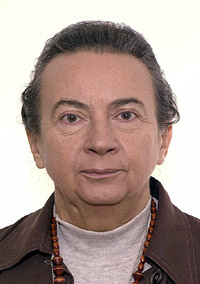
Romanian journalist Ana Maria Narti managed to resume her profession again in her country of asylum, Sweden, and went on to become a prominent member of the Swedish parliament.
In the spring of 1970, Narti was accompanying a Romanian theatre group touring in Europe. After travelling through Italy, the company went to Sweden, where Narti also had another mission - to inform a friend that Nicolae Ceausescu was consolidating his dictatorial power in Romania and that she would be in danger if she returned. News came that the government crackdown was intensifying, so Narti decided she had to stay. She knew that to go back then would mean giving up her profession as a journalist.
In May 1970, Narti applied for political asylum in Sweden and was granted refugee status after three months. She began learning Swedish and specialised in the history of theatre and film at Stockholm University. Initially, she earned her living freelancing: she taught theatre and film in small professional schools until her grasp of the Swedish language allowed her to take up journalism again.
She began writing articles for Swedish newspapers. After 1985, once her relatives had fled Ceausescu's Romania, Narti began denouncing the regime in her home country. At the same time, she concerned herself with minority issues and immigration policy in Sweden. For 20 years, she published her opinions in a column for the Swedish national daily, Dagens Nyheter. She has campaigned for better conditions for immigrants and refugees in Sweden and has also helped implement projects aimed at reducing unemployment.
Elected in October 1999, Narti became a member of the Swedish Parliament for the Swedish Liberal Party (Folkpartiet Liberalerna).

As a university student, Eya Nchama traced the history of an African slave who became a professor in Spain, and this interest in history and human rights has shaped his career.
As a boy growing up in Equatorial Guinea, he attended a mission primary school and went to high school in Santa Isabel in 1960. His lifelong struggle for the promotion of human rights began at the Complutense University of Madrid, Spain. He chose for his dissertation topic a curious 16th-century character known as Juan Latino, who was brought to Europe to serve another young boy. The child slave, Juan, is said to have educated himself by reading the books he had to carry to school for his master. Latino caught up fast, earned his nickname because of his linguistic ability, and became a renowned professor at the University of Granada.
Nchama originally left his country to study. But when he returned, he found that the independence struggle had led to a dictatorship. He decided to leave again. "I could not teach that Equatorial Guinea was created by God thanks to Marcias Nguema," he said of the then President. Back in Spain, Nchama began to campaign for human rights in his home country. The Spanish secret services soon approached him and asked him to stop denouncing his government.
Nchama moved to Switzerland, where he studied child development under eminent child psychologist Jean Piaget and with Spanish psychiatrist Julien de Ajurriaguera, then director of the Geneva Psychiatric Clinic.
In November 1974, he asked that his passport be renewed. The authorities of Equatorial Guinea refused, and Switzerland granted him refugee status.
In 1979, the UN Human Rights Commission recognised the continuing human rights violations in Equatorial Guinea and appointed a Special Rapporteur. But Nchama's battle did not end there. He went on to represent various non-governmental organisations including the Mouvement International pour l'Union Fraternelle entre les Races et les Peuples (International Movement for Fraternal Union Among Races and Peoples.
Nchama was one of the first campaigners to bring to light the plight of women suffering from female genital mutilation and lobbied for the Inter-African Committee on Traditional Practices Affecting the Health of Women and Children, based in Geneva. He was also the president of the Anti-Racist Information Service. In 1993, he served as Special Counsellor for NGOs (non-governmental organisations) of the Secretary-General at the UN World Human Rights Conference in Vienna.
From 1982 to 1996, he headed a research team on African history at Switzerland's Institut Universitaire d'Etudes du Développement. He has also co-authored many books concerning refugee issues and development in Africa. He is currently employed by the Geneva government, working for the Council of State and advising NGOs coming to Geneva.
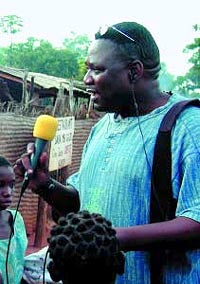
As the editor of Le Messager and co-ordinator of the satirical paper Le Messager-Popoli, Eyoum Nganguè is a journalist whose cause is that of freedom of speech and justice in his native Cameroon.
In December 1995, the constitution was amended to make Cameroon's head of state a senator-for-life after the presidency, at the same time as state pensions were frozen. Nganguè denounced this contradiction and was sentenced to a year in prison for "insulting the head of state and the members of parliament". In fact, he was a renowned whistle-blower, exposing numerous corruption scandals in his articles.
This time, he was fined (but did not pay) and imprisoned on his 30th birthday. "I thought I was Kafka," says Nganguè, whose wry sense of humour helped him get through his jail sentence.
Reporters Sans Frontières (RSF) and the American, British and French delegations in Douala spoke out in his defence. He was released on parole after 65 days. But the President was re-elected and the managing director of Le Messager was arrested. Nganguè decided to flee to France, and with help from RSF and France Terre d'Asile, he was recognised as a refugee six months after his arrival in June 1998.
Nganguè remains a correspondent for Le Messager and other African papers. Opposed to the "brain drain" and to settling in France permanently, Eyoum wants his experience of exile to be as fruitful as possible and promises to return to Cameroon as soon as he can. "If I became a French citizen, it would be a waste of my time. Here, there is nothing left to do, whereas in my country ... "
He is working on a thesis ("The role of music in the political debate in the Ivory Coast") in social anthropology at the Ecole des Hautes Etudes en Sciences Sociales and has learnt Lingala, a language spoken in both Congos.
In June 1999, Nganguè co-founded the Journalistes Africains en Exile association, of which he is president. It aims to create solidarity and a free speech platform for exiled African journalists and political cartoonists and to publicise the need for efficient asylum procedures.

Haing Ngor is known to millions as the Oscar-winning star of "The Killing Fields", a movie that brought to the world's attention the atrocities committed under Cambodia's Khmer Rouge regime. Ngor, a physician, had no acting lessons, but four years of torture and starvation as a slave labourer under the Khmer Rouge prepared him well for the role.
He portrayed Dith Pran, a Cambodian translator working for New York Times correspondent Sidney Schanberg. The movie, directed by Roland Joffe, tells the story of how Schanberg left Pran behind when the Americans pulled out of Viet Nam, then, wracked with guilt, tried to help him escape. Many of the experiences retold in the film are remarkably similar to those undergone by Ngor.
When the Khmer Rouge began purging Cambodia of intellectuals and professionals in 1975, Ngor was the perfect target: a well-educated, prosperous, bespectacled obstetrician and gynaecologist. To escape prosecution, he pretended to be an ignorant taxi driver. Still, he was arrested and tortured repeatedly. He told of having to abandon one of his patients on the operating table during the fall of Phnom Penh. On another occasion, he saw his pregnant wife die before his eyes. Had he acknowledged that he was a doctor, his entire family would have been killed immediately.
In 1980, Ngor escaped from Cambodia and migrated to the United States. Four years later, he won his Academy Award. Seeing the international attention his acting brought to Cambodia's situation, he searched for political cinematic opportunities and devoted much of his time and money to helping refugees. He organised the Brussels-based groups, Aid to Displaced Persons, and Enfants d'Angkor. He said he considered it his duty to help his homeland, one of the poorest countries in the world. He told his own story in a graphic autobiography, "A Cambodian Odyssey", published in 1988.
In 1996, Ngor was shot dead outside his Los Angeles home on the edge of Chinatown. There was speculation that former Khmer Rouge dictator Pol Pot had ordered his assassination because of his relentless campaign to bring to justice the perpetrators of the past atrocities. Hun Sen, leader of the Cambodian People's Party, then in power, suggested that Ngor's death was a "political murder", an act of intimidation against the government. However, a trial found that Ngor had been shot by gang members trying to steal his watch.

Osagyefo Kwame Nkrumah guided Ghana to independence. He was the first president of Ghana and, as the father of Pan-Africanism, has influenced the politics of a whole continent. In Ghana itself, no political figurehead would win an election without incorporating "Nkrumahism" into his manifesto.
Nkrumah was born into the family of a goldsmith in the town of Nkroful in south-western Ghana. There is some doubt as to the exact date of his birth; it was never officially recorded, as was the practice in those days.
He attended a local Roman Catholic mission school, where he excelled. In his teens, he worked as an untrained elementary school teacher, qualifying with a teacher's certificate in 1930 after studying at Achimota College in the Ghanaian capital, Accra. After graduating, he taught at several Catholic elementary schools.
In 1935, he sailed to the United States, where he attended Lincoln University in Pennsylvania, and graduated with a bachelor's degree in economics and sociology. He later obtained a theology degree from the Lincoln Theological Seminary in 1942 and received a master's degree in education and philosophy from the University of Pennsylvania in 1943.
In his autobiography, he remembers that in his application to the Dean for admission to Lincoln University, he quoted from Tennyson's "In Memoriam":
"So many worlds, so much to do,
So little done, such things to be"
"Those years in America and England were years of sorrow and loneliness, poverty and hard work," he went on, "but I have never regretted them because the background that they provided has helped me to formulate my philosophy of life and politics."
Nkrumah was attracted by the writings of Marx, Engels and Lenin. He formed an African students' organisation and became a popular speaker, demanding the liberation of Africa from the yoke of colonialism. He advocated Pan-Africanism, a movement that campaigned for an independent and united Africa.
In 1945, Nkrumah went to London to study law and economics, and in same year, helped to organise the fifth Pan-African congress in Manchester. During the rally, he met prominent black activists including W.E.B. Du Bois, future Kenyan president Njomo Kenyatta and the American actor and civil rights activist, Paul Robeson.
He abandoned his studies in 1946 to become Secretary General of the West African National Secretariat, which was formed to co-ordinate efforts to bring about West African independence. In the same year, he became Vice President of the West African Students' Union, a pro-independence youth organisation of militant African students in Britain.
The following year, Nkrumah returned to Ghana to serve as Secretary General of the United Gold Coast Convention (UGCC), a nationalist party. In 1948, he led a boycott of foreign products in anti-colonial protests that led to riots in Accra. He was arrested alongside other UGCC leaders and imprisoned by the British colonial authorities. He then left the UGCC and founded the Convention People's Party (CPP).
After pro-independence strikes, Nkrumah was again arrested and imprisoned on charges of subversion. In 1951, the British authorities organised legislative council elections. The CPP won most seats and Nkrumah, still in prison, won the seat for Accra. He was released and appointed leader of the government. He later became Prime Minister and guided Ghana to independence in 1957. In 1960, he won the first presidential elections.
After most Sub-Saharan countries won their independence, Nkrumah rallied African leaders and preached for a united Africa. This never materialised, but his vision soldiered on to become the Organisation of African Unity (OAU), now known as the African Union.
While visiting China in 1966, Nkrumah's government was overthrown in a military coup. He spent his exile years in Guinea's Conakry, where President Sékou Touré appointed him honorary co-President of Guinea.
Beside his political achievements, Nkrumah established himself as a prolific writer. He published "Autobiography" (1957), "Towards Colonial Freedom" (1962), "Neo-colonialism: The Last Stages of Imperialism" (1965), and "Dark Days in Ghana" (1968).
In "The Conakry Years: Letters and Documents", Nkrumah wrote: "The black man is not mad. He is a human being like any other human being. It is the world historical situation and the environment which have made him what he is. When Africa is free and united with one government for the whole continent the black man, wherever he may be, either in Africa, West Indies or USA, will discover his personality, his dignity and his honour."
Nkrumah died in a Romanian hospital in 1972.
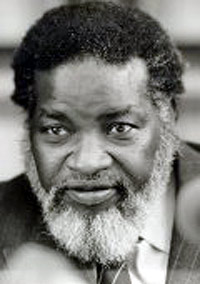
One of 10 children brought up by farmers, Sam Nujoma fought for the independence of his country from South Africa and was elected the first president of the new nation, Namibia, in 1990.
Born in a village in what was then known as South-West Africa, Nujoma eventually left for the capital, Windhoek, where he started working for South African Railways.
His political career began with the mobilisation of workers in towns in the area. In 1959, he was elected leader of the Owamboland People's Organisation, which subsequently became the South West Africa People's Organisation.
During this time, he petitioned the United Nations to free Namibia from South African rule. At that time, South-West Africa was controlled by the white minority apartheid government of South Africa, which refused to give up its mandate over South-West Africa and instead extended its repressive policies over the territory.
As Nujoma's political activities gained him international recognition, he was forced to go into exile on March 1, 1960. In 1962, having fled to Tanzania, he took control of the new South West Africa People's Organisation (SWAPO). In 1966, his UN-recognised liberation force began attacking South-West Africa. After more than 20 years of fighting and diplomatic negotiations, Nujoma was able to return from exile and to a hero's welcome. He led his country to independence in 1990 and was subsequently elected president.
Nujoma has been praised for establishing good race relations and respect for the rule of law in Namibia. "While in exile, whether in Africa or beyond, I always dreamed about Namibian independence, which finally came true," he says. "But independence is not an end in itself. We have had to develop our country, restore democratic rule, create jobs and redistribute the nation's wealth, held by a tiny minority, all the while taking care to further national reconciliation."
Nujoma was overwhelmingly re-elected in 1994. He and his party SWAPO went on to win a landslide victory in the 1999 elections, with Nujoma taking 77 percent of the presidential vote.
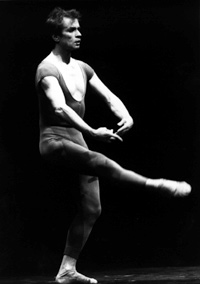
Rudolf Nureyev's legendary leap over the barrier at Le Bourget airport on June 17, 1961, marked a turning point in the extraordinary career of this talented artist and a significant moment in the history of the Cold War. Following triumphant performances in Paris in 1961, the young prodigy from Leningrad's Kirov Ballet decided to ask for political asylum in France.
Nureyev was born on a Trans-Siberian train near the shores of Lake Baikal. "It seems to me very symbolic and revealing that I should have been born en route in between two places," he once said. "It makes me feel that it was my destiny to be cosmopolitan. Ever since I was born, I have had no real sense of 'belonging', no real country or house to call my own. My existence had none of the usual, normal limitations which make for a feeling of permanence and this has always left me with a strong sensation of having been born stateless."
His parents were Moslem peasants of Tatar origin. As a political commissar, Nureyev's father was constantly on the move. His mother was on her way to join him in Vladivostok when she gave birth prematurely to Rudolf.
The family settled in Moscow when Nureyev was three months old. Three years later, a bomb destroyed their home and they lost everything. They were obliged to move to a village in the Bashkir autonomous republic, their region of origin. Nureyev was five years old when they settled in Ufa, capital of Bashkir. It was there that he discovered dancing. He joined his school's folk-dancing group, and it was during a performance at the local opera that he understood his true vocation.
"I was utterly possessed. From that day I can truthfully date my unwavering decision to become a ballet dancer. I felt 'called'. Watching the dancers that night, admiring their other-worldly ability to defy the laws of balance and gravity, I had the absolute certitude that I had been born to dance." Despite his father's opposition, Nureyev stuck to his guns. He was soon noticed by a former dancer named Anna Udelstova, who sensed that the young man should be encouraged and took him under her wing.
Nureyev danced a few minor roles at the Ufa Opera, and then went on tour with the company to Moscow, where he enrolled at the Bolshoi Ballet School. His sights, however, were set on the Kirov. On August 17, 1955, he set out, without a kopeck in his pocket, for Leningrad. There he met up with Udelstova, who urged him to apply for an audition at the Kirov. He was accepted immediately, at the age of 17.
Three years of study with Alexander Pushkin confirmed him as the school's most outstanding pupil. Despite his individualism and lack of discipline, and despite being described as insubordinate by his teachers, Nureyev made extraordinary progress and became the partner of the greatest stars of the period. He proceeded to eclipse them. The wild acclaim of the Paris audiences during the company's European tour confirmed him as a star at the age of 23.
The day after his dramatic decision to stay in France, a car came to pick him up from the Ministry of the Interior. He recalled, "Before handing me a titre de voyage (travel document), the man in charge of my papers asked me what would be my future source of income while in France. 'My source of income will probably be the Marquis de Cuevas Ballet Company,' was finally the best I could tell the man."
In fact, he left Paris and the Marquis' company and went to London to join the British ballerina, Margot Fonteyn. They formed one of classical ballet's most memorable partnerships.
He continually extended his capabilities and became a proponent of modern dance. A perfectionist at heart, he refined his technique and performed works by all the great choreographers: Bournonville, Petipa, Fokine, Balanchine, Ashton, MacMillan, Martha Graham.
A solitary character, Nureyev never really settled anywhere. Born in the USSR, he held an Austrian passport as of 1982, resided in France and worked all over the world. Being 50 years old and the Director of Ballet at the Paris Opera did not stop him from dancing. As he said himself, the theatre was his homeland, and dancing his whole life. He also starred in two films, including "Valentino" (1977).
But a significant event occurred in the life of this eternal wanderer in November 1987: after 26 years of exile, the Soviet authorities granted him a two-day visa to visit his sick mother.
Nureyev died on January 6, 1993. He was buried in the tiny Russian cemetery at Sainte-Geneviève-des-Bois in France.

General Bernardo O'Higgins Riquelme, founding father of the Republic of Chile, was forced into exile in Peru in 1823, where he remained till his dying days.
O'Higgins was born in Chillán in south-central Chile. He was the son of Ambrosio O'Higgins, an Irish-born high-ranking official in the service of the Spanish crown, and Isabel Riquelme, the Chilean Creole daughter of an aristocratic colonial family.
The young Bernardo was sent to England, where he was educated in the manner of a typical young Englishman. His math teacher, however, was Francisco de Miranda, a campaigner for Latin American independence. O'Higgins became close to the young Latin American revolutionaries known as the Lautarina Lodge. He returned to Chile in 1802 and while running the ranch he inherited from his father, secretly diffused separatist ideas. When the campaign against Spanish rule was unleashed in 1810, O'Higgins was largely responsible for the recruitment and training of two military regiments.
He stood out as a courageous and daring revolutionary military leader. After defeat at the battle of Rancagua, he took refuge in Argentina. There, together with the Argentine general, José de San Martín, he planned to invade Chile. In January 1817, his forces crossed the Andes and on February 12, they defeated the royalists. On February 18, 1817, O'Higgins was appointed Supreme Director of Chile.
His principal preoccupation was to oust all remaining Spanish troops. His next project was to embark on the liberation of Peru, which he attempted in 1820. However, the campaign failed and after an uprising in the south of Chile, he was placed under house arrest by General Ramón Freire.
O'Higgins was finally granted a passport in July 1823, and left his country for exile, accompanied by his mother, his stepsister and his young son. He headed for Peru, intending to continue on to Ireland or England. But when he arrived in Peru and saw the situation the country was in, he decided to stay and help the independence cause.
During his Peruvian exile, he met Simón Bolivar, "The Liberator", who was preparing the final offensive against Spanish troops in Peru. O'Higgins requested that Bolivar enlist him in the army as an ordinary soldier. Bolivar appointed him as a general and eventually the Spanish were decisively defeated in the battle of Ayacucho.
In his last years, O'Higgins ran a ranch in Peru, but it ran into financial difficulties and he became seriously ill. His one wish was to return to Chile. In 1841, he received authorisation to return, but shortly afterwards, he suffered from a series of heart attacks. In October 1842, the Chilean government officially reinstated him as a commander in chief, but before he could return, he died in Lima on October 23, 1842.

In 1977, as a student active against Argentina's military dictatorship, Alicia Partnoy became one of Argentina's 30,000 desaparecidos (disappeared), but she is one of the few who survived the torture and imprisonment.
About 9,000 people were officially reported to have been killed during Argentina's Dirty War (1976-83). Human rights groups say the number of victims tortured and killed could be as high as 30,000.
On January 12, 1977, Partnoy was at home with her 18-month-old daughter when the military kidnapped her, forcing her into a military truck. That same day, her husband was taken from his workplace. She was initially taken to the army headquarters and then to the concentration camp in Bahia Blanca, a town in the province of Buenos Aires, known as La Escuelita (The Little School). She was imprisoned there for three months, with no idea of what had happened to her daughter, before being transferred to a normal prison.
In 1979, following a human rights fact-finding mission by the Washington-based Organization of American States, she was released and exiled to the United States.
Partnoy recorded the memory of her suffering in "The Little School", written in exile, which is an account of life in the secret prison, cut off from her family. She has testified in front of the official commission into the extent of political violence and human rights violations, the Comisión Nacional Sobre la Desaparición de Personas and her testimony is included in "Nunca Mas", (1981). She was also a key witness in the Trials for the Truth in Bahia Blanca, where "The Little School" was introduced as evidence. In 1988, she edited "You Can't Drown the Fire: Latin American Women Writing in Exile", an anthology of 35 women's writing dealing with gender issues during periods of severe political repression.
Partnoy currently teaches modern languages and literature at Loyola Marymount University in Los Angeles. She served as a member of the Advisory Board of Amnesty International, which she continues to support.
Today Partnoy lives in Los Angeles with her second husband Antonio Leiva, also a refugee from Argentina, and their two young daughters. Partnoy's mother, Raquel, a grandchild of Russian-Jewish immigrants, joined her daughter in 1995. An art teacher and painter, her work often depicts the efforts of human beings to survive in a world where genocide, repression and discrimination threaten their lives. Partnoy's first daughter, Ruth Irupe Sanabria, who lived with Raquel while her mother was imprisoned, is a poet and activist. Recently all three held an exhibition Art, Memory and Politics, Three Generations Survive State Terrorism in Argentina, presenting their work together.
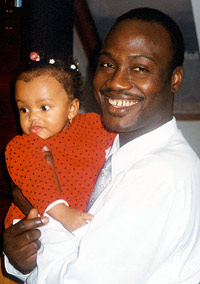
When rebel soldiers broke into his family home in the Liberian capital of Monrovia and murdered his mother in cold blood, university student Victor Perry decided he had to escape from the civil war.
Perry embarked on what would become a journey of epic proportions. He made his way on foot to neighbouring Ivory Coast, and later to Nigeria. He then boarded a vessel of the ECOMOG peacekeeping force, the first time in his life he had been on a ship. He eventually disembarked in Lebanon.
Perry walked for three days across the mountains to neighbouring Syria, where a smuggler offered to take him to Western Europe for $5,000. "I was eventually dropped off in a small village and told I was in Germany," he recalls. The trafficker had already left the country before Perry found out he was actually in Slovakia, a nation he had never heard of until then. The trafficker had left with his passport. Perry was put into a detention centre, and he asked for political asylum. On November 11, 1996 he was transferred to a refugee camp in Adamov, where the UN refugee agency provided him with assistance.
In Slovakia, Perry was given refugee status within four months and qualified as the first African teacher in the country, teaching economics and biology at a secondary school near Ruzomberok. Twenty months after his long journey, Victor met his wife-to-be, Marta, whom he married in November 1998. They now have a baby, Rachel.
When asked what positive aspects he has drawn from his experience of exile, Perry says: "I realised that I became more mature, independent, tolerant, godly and I have a greater ability to take life as it is."